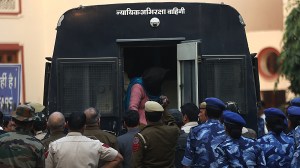Spoke in Ludhiana’s wheel
WORKER unrest in Ludhiana’s bicycle industry has now got some political colour. With the Left showing special interest in the city, the...

WORKER unrest in Ludhiana’s bicycle industry has now got some political colour. With the Left showing special interest in the city, the battlelines have been drawn.
On Thursday, a high-power delegation of industrialists met the city’s bureaucrats. ‘‘The Left parties have already announced their intention to contest elections for the Parliamentary seat and two Assembly segments, besides a number of municipal council seats. They have indicated that enrollment of migrant workers in the voters’ list should be done at the earliest,’’ say the city’s industrialists.
The CPM and CITU, which have a solid base and loyal cadre in Ludhiana, have become very active. Harkishen Singh Surjit accompanied by other CPM leaders now visit Ludhiana regularly, holding rallies and meetings every Sunday. Sita Ram Yechury, Brinda Karat and Prakash Karat too have paid a visit. ‘‘We are fighting for the rights of the workers,’’ says Jatinderpal Singh, vice-president of the Centre for Indian Trade Unions (CITU).
ON November 1, 2005, two units of Hero Group of Companies shut their operations, leaving 1,500 workers jobless. Labour unrest that had already set in three years ago, now intensified. From March 2003 to May 2003, a 77-day strike at Hero Group of Companies— Hero Cycles, Highway Cycles, Rockman, Hero Cycles Mangli Unit and Hero Exports— have been reported.
This strike triggered unrest at Avon Cycles, Nova Cycles, KW Cycles, knitting unit Eveline International, Ralson Tyres. ‘‘In the last one year, more than 25 FIRs have been registered against the workers because of violence during strikes,’’ says Mukesh Kumar in charge of Sherpur police station.
S.K. Rai, MD of Hero Cycles says, ‘‘Following continuous losses in both our units, the company was forced to apply for closure in May and June 2005, and finally the Labour Department also gave the permission.’’
IN all the post-strike agreements, striking workers have either lost their jobs or have been chargesheeted while union leaders don’t appear to have suffered at all.
The other fallout of this unrest has been the emerging preference for Punjabi and Himachali workers. Says Rai, MD of Hero Cycles: ‘‘The problem is grave in the cycle industry in Punjab, as maximum workers are from eastern UP and Bihar. However, the scene is now changing. After lawlessness and repeated violence in many units, the owners are recruiting Punjabi and Himachali workers.’’
At Avon cycles, the 80:20 ratio of Bihari to Punjabi workers has been changed to 50:50. ‘‘So far, the Punjabi workers have not associated themselves with the CITU, so we have an advantage,’’ says Varinder Kapoor, general-secretary of the United Cycles Parts and Manufacturers’ Association.
In the midst of workers’ rallies and political hobnobbing, workers of the two closed Hero units are trying to come to terms with their unemployed status. Of the over Rs 11-crore compensation, Rs 80 lakh has already been disbursed, the company’s legal advisor, B D Arora says.
As Ludhiana frets over its uncertain future, Punjab labour commissioner Somparkash says there is no cause for worry. ‘‘The situation is under control, in fact compared to other states, it’s better here.’’



- 01
- 02
- 03
- 04
- 05




























